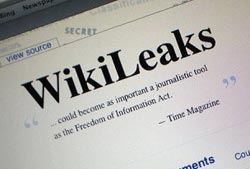UN voices concern at 'cyber war' against wikiLeaks
The United Nations human rights chief voiced concern today over reported 'cyber war' pressure on private companies to sever links with the whistle-blowing website WikiLeaks, saying this could amount to attempted censorship in breach of international covenants.
|
Don't miss |
 |
At a news conference in Geneva she also voiced concern at some of the US actions in Iraq revealed by the documents, which could constitute human rights violations.
"The files reportedly indicate that the US knew, among other things, about widespread use of torture and ill-treatment of detainees by Iraqi forces, and yet proceeded with the transfer of thousands of people who had been detained by US forces to Iraqi custody between 2009 and 2010," she said.
"In my view, this could potentially constitute a serious breach of international human rights law," she added, hailing efforts by independent UN experts to obtain clarification from the US, Iraqi and Afghan authorities on the reports of torture and ill-treatment described in the WikiLeaks documents.
"I urge all countries to take necessary measures to investigate the allegations made in these reports and to bring to justice those responsible for human rights abuses."
She said the cyber war now raging over WikiLeaks is "just astonishing… Let me say that the WikiLeaks cases raises complex human rights questions about balancing freedom of information, the right of people to know, and the need to protect national security or public order. This balancing act is a difficult one."
The International Covenant on Civil and Political Rights provides for the right to freedom of expression, including the right to seek, receive and impart information and ideas of all kinds, a right which may be restricted only when necessary, proportional, provided by law, and justified strictly on the need to protect national security or public order, Ms. Pillay stressed.
"So who is best to judge or strike at the balance but courts of law," she said. "Courts of law are equipped to address the delicate issue of balancing competing rights and values. If [WikiLeaks founder] Mr. [Julian] Assange has committed any recognized offence, then the judicial system following fair procedures should be able to address how these rights can be balanced."
While it is unclear whether the individual acts of pressure exerted by private actors directly infringe on States' human rights obligations to ensure respect of the right to freedom of expression, "taken as a whole, that could be interpreted as an attempt to censure the publication of information, that is potentially violating WikiLeaks' right to freedom of expression," she added.
"I would say there is currently no clarity at the moment about the source of the cyber attacks and counter attacks. They nevertheless raise concerns about the effective protection that concerned States should provide in relation to the right of the WikiLeaks' founder to freely share information, as required in article 19.2 of the International Covenant on Civil and Political Rights."
 0
0 







Go to Forum >>0 Comments